The code that I am putting up is the result of the third week of working on this class. I had a pretty good handle on things, (or so I thought), but this week is focusing on pointers and I am clueless as to why I keep getting this error. I keep getting a Debug Assertion Failed! error along with a general "Buffer is too small" explanation.

Here is the complete code that I have compiling on a Win8 OS using VS 2012 RC Version 11.0.505221.1. The only difference from what I have compiled in Linux is that I am using strcpy_s() in this code because for some reason MS doesn't like strcpy().
#include "stdafx.h"
#include <iostream>
#include <string>
#include <iomanip>
#include <limits>
using namespace std;
class HotelRoom
{
char roomNumber[4];
char guest[81];
int roomCapacity, currentOccupants;
double roomRate;
public:
HotelRoom(char[], char[], int, double);
~HotelRoom();
void DisplayRoom();
void DisplayNumber();
void DisplayName();
int GetCapacity();
int GetStatus();
double GetRate();
void ChangeStatus(int);
void ChangeRate(double);
};
HotelRoom::~HotelRoom() {
cout << endl << endl;
cout << "Room #" << roomNumber << " no longer exists." << endl;
delete [] guest;
}
void HotelRoom::DisplayName() {
cout << guest;
}
void HotelRoom::DisplayNumber() {
cout << roomNumber;
}
int HotelRoom::GetCapacity() {
return roomCapacity;
}
int HotelRoom::GetStatus() {
return currentOccupants;
}
double HotelRoom::GetRate() {
return roomRate;
}
void HotelRoom::ChangeStatus(int occupants) {
if(occupants <= roomCapacity) {
currentOccupants = occupants;
}
else {
cout << endl << "There are too many people for this room. Setting occupancy to -1." << endl;
currentOccupants = -1;
}
}
void HotelRoom::ChangeRate(double rate) {
roomRate = rate;
}
HotelRoom::HotelRoom(char room[], char guestName[], int capacity, double rate)
{
strcpy_s(roomNumber, room); //Compiles fine with strcpy on Linux, but MS is making me use strcpy_s to compile
guestName = new char[strlen(guestName) + 1];
strcpy_s(guest, guestName); //Same as above
roomCapacity = capacity;
currentOccupants = 0;
roomRate = rate;
}
void HotelRoom::DisplayRoom()
{
cout << setprecision(2)
<< setiosflags(ios::fixed)
<< setiosflags(ios::showpoint);
cout << endl << "The following is pertinent data relating to the room:\n"
<< "Guest Name: " << guest << endl
<< "Room Number: " << roomNumber << endl
<< "Room Capacity: " << GetCapacity() << endl
<< "Current Occupants: " << GetStatus() << endl
<< "Room Rate: $" << GetRate() << endl;
}
int main()
{
int numOfGuests;
char roomNum[4];
char buffer[81]; //Buffer to store guest's name
int roomCap;
double roomRt;
bool badInput = true;
cout << endl << "Please enter the 3-digit room number: ";
do { //loop to check user input
badInput = false;
for(int x = 0; x < 3; x++)
{
cin >> roomNum[x];
if(!isdigit(roomNum[x])) //check all chars entered are digits
{
badInput = true;
}
}
char x = cin.get();
if(x != '\n') //check that only 3 chars were entered
{
badInput = true;
}
if(badInput)
{
cout << endl << "You did not enter a valid room number. Please try again: ";
}
} while(badInput);
for(;;) //Infinite loop broken when correct input obtained
{
cout << "Please enter the room capacity: ";
if(cin >> roomCap) {
break;
} else {
cout << "Please enter a valid integer" << endl;
cin.clear();
cin.ignore(numeric_limits<streamsize>::max(), '\n');
}
}
for(;;) //Infinite loop broken when correct input obtained
{
cout << "Please enter the nightly room rate: ";
if(cin >> roomRt) {
break;
} else {
cout << "Please enter a valid rate" << endl;
cin.clear();
cin.ignore(numeric_limits<streamsize>::max(), '\n');
}
}
cin.get(); //Dump the trailing return character
cout << "Please enter guest name: ";
cin.getline(buffer, 81);
HotelRoom room1(roomNum, buffer, roomCap, roomRt);
for (;;) { //Infinite loop broken when correct input obtained
cout << "Please enter the number of guests for room #";
room1.DisplayNumber();
cout << ": ";
if (cin >> numOfGuests) {
break;
} else {
cout << "Please enter a valid integer" << endl;
cin.clear();
cin.ignore(numeric_limits<streamsize>::max(), '\n');
}
}
room1.ChangeStatus(numOfGuests);
room1.DisplayRoom();
cout << endl << "The following shows after the guests have checked out." << endl;
room1.ChangeStatus(0);
room1.DisplayRoom();
room1.ChangeRate(175.0);
for (;;) { //Infinite loop broken when correct input obtained
cout << "Please enter the number of guests for room #";
room1.DisplayNumber();
cout << ": ";
if (cin >> numOfGuests) {
break;
} else {
cout << "Please enter a valid integer" << endl;
cin.clear();
cin.ignore(numeric_limits<streamsize>::max(), '\n');
}
}
room1.ChangeStatus(numOfGuests);
room1.DisplayRoom();
return 0;
}
UPDATE:
I've added cout statements to see where the problem occurs in the program, and it is definitely at the strcpy() statements in the HotelRoom constructor. Here is the constructor, and following is the output that I received
HotelRoom::HotelRoom(char room[], char guestName[], int capacity, double rate)
{
cout << endl << "Attempting 1st strcpy...";
strcpy_s(roomNumber, room); //Compiles fine with strcpy on Linux, but MS is making me use strcpy_s to compile
cout << endl << "1st strcpy successful!";
guestName = new char[strlen(guestName) + 1];
cout << endl << "Attempting 2nd strcpy...";
strcpy_s(guest, guestName); //Same as above
cout << endl << "2nd strcpy successful!";
roomCapacity = capacity;
currentOccupants = 0;
roomRate = rate;
}
